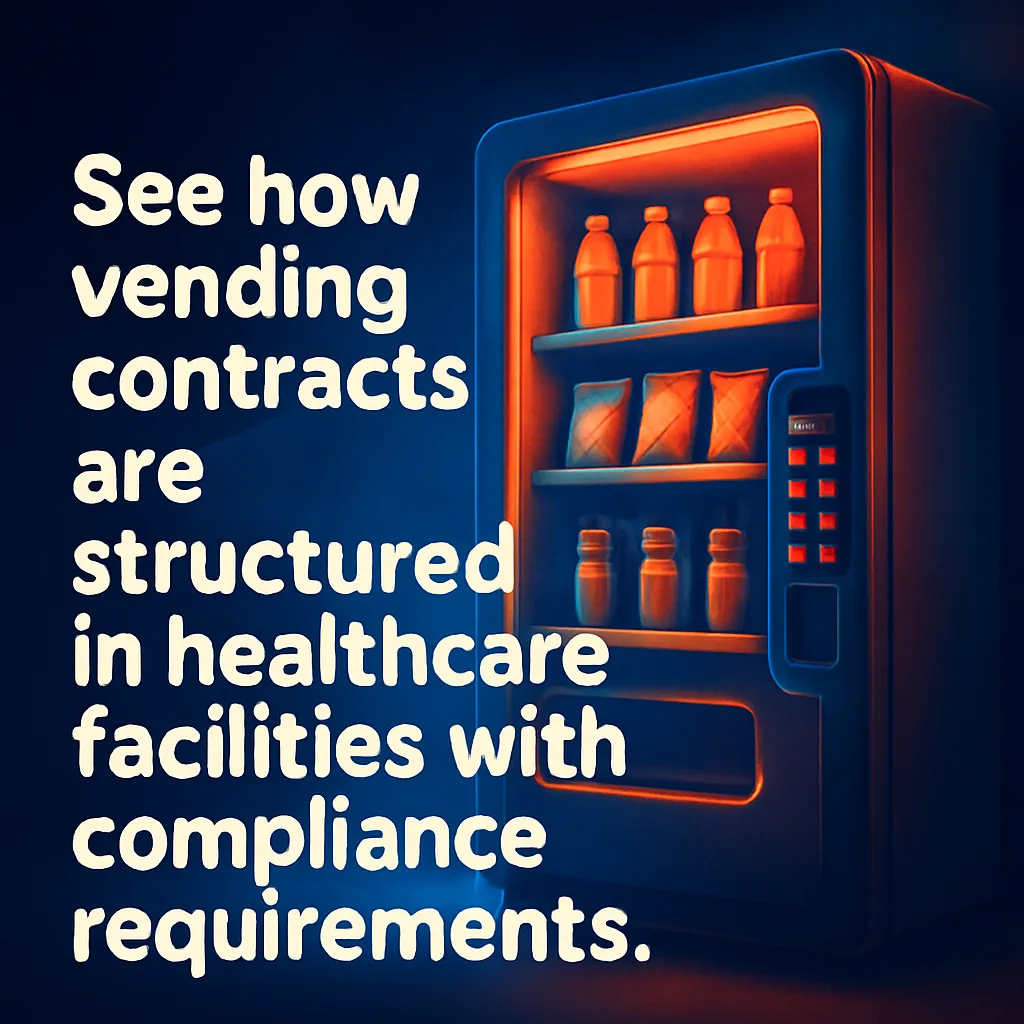Vending Contracts for Hospitals
See how vending contracts are structured in healthcare facilities with compliance requirements.
Back to Vending Contracts ResourcesSee how vending contracts are structured in healthcare facilities with compliance requirements.
Back to Vending Contracts ResourcesVending machine contracts for hospitals are highly specialized, focusing on hygiene, compliance, and convenience for both staff and visitors in demanding environments.
![]() Ensure compliance with health regulations and dietary guidelines.
Ensure compliance with health regulations and dietary guidelines.
![]() Support 24/7 access to refreshments for hard-working healthcare staff.
Support 24/7 access to refreshments for hard-working healthcare staff.
![]() Prioritize touchless and hygienic vending solutions for patient safety.
Prioritize touchless and hygienic vending solutions for patient safety.

In the highly regulated environment of hospitals and other healthcare facilities, vending machine contracts are much more than simple agreements for snacks and drinks. They are intricate documents that must account for stringent health codes, sanitation standards, and the unique needs of staff, patients, and visitors operating on a 24/7 schedule. A well-crafted contract ensures reliable service, appropriate product offerings, and compliance with all relevant regulations.
When drafting or reviewing a vending contract for a hospital, several key clauses and considerations come into play. Beyond standard terms like contract length, pricing, and service schedules, healthcare settings demand specific attention to areas such as hygiene, product suitability, and operational reliability. Many facilities prioritize touchless vending options to minimize potential contamination points, especially in high-traffic areas.
Hospitals often have internal wellness policies or are subject to external mandates regarding product offerings. Contracts should clearly define the types of products to be stocked, emphasizing healthy choices, dietary-restricted options, and transparent nutritional information. This helps promote well-being among staff and visitors, aligning with the facility's mission. Ensuring healthy vending options adhere to these guidelines is paramount.
Given the critical nature of a hospital's operations, vending machine downtime is unacceptable. Contracts must include robust Service Level Agreements (SLAs) specifying response times for repairs, restocking frequency, and cleanliness standards. Regular maintenance schedules and emergency repair protocols are vital to ensure continuous availability, particularly for critical areas like staff lounges or waiting rooms that operate around the clock. Exploring options like 24/7 vending solutions can also ensure continuous access.
The strategic placement of vending machines within a large hospital campus is crucial. Contracts should detail not only the number of machines but also their specific locations, ensuring accessibility for all users, including those with disabilities. Clear guidelines for pedestrian flow and safety are also important. Furthermore, contracts should anticipate the need for machines in various settings, from busy emergency departments to quieter patient waiting areas.
Developing a comprehensive vending contract for a hospital requires careful consideration of these factors to ensure seamless integration, optimal service, and full compliance with the healthcare environment's unique demands. It's about more than just convenience; it's about supporting the health and well-being of everyone within the facility.
Key components often include terms for machine placement, product selection, service schedule, commission rates, and compliance with healthcare facility regulations.
Hospital vending contracts must address health and safety regulations, dietary guidelines (e.g., for healthy options), and potentially HIPAA compliance for data privacy if advanced payment systems are used.
Yes, many hospitals require contracts to include provisions for healthy, nutritious snack and beverage options to support staff and patient well-being, often aligning with wellness initiatives.
Hospital vending contracts frequently include strict SLAs covering response times for machine malfunctions, restocking frequency, and cleanliness standards to ensure uninterrupted service.
Contracts may specify requirements for secure machine installation, cash handling procedures, and sometimes surveillance or access control integration to prevent theft and maintain safety.
Commission rates can vary, often based on machine type, product sales volume, and the overall agreement. Hospitals may negotiate a percentage of sales or a fixed monthly fee.
Absolutely. Hospitals can specify the need for snack, beverage, combo, or even specialized machines like those dispensing medical supplies or PPE, as well as modern options with cashless payments and touchless interfaces.
Hospital vending contracts typically outline the vendor's responsibility for maintenance, repairs, and response times for breakdowns, including provisions for refunds or replacement if necessary.
Many hospital vending contracts include exclusivity clauses, granting a single vendor the right to operate all vending machines within designated areas of the facility.
Contract lengths vary but commonly range from 1 to 5 years, often with options for renewal, depending on the scope of service and agreement between the hospital and vendor.